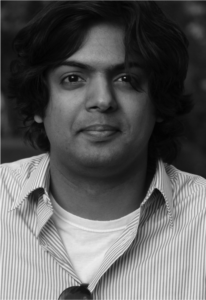Abhinav Kandala
 Abhinav Kandala is a research staff member in the experimental quantum computing group at the IBM T.J. Watson Research Center, where his research has focused on the coherence and control of superconducting qubits, as well as near-term applications of quantum computers. After receiving his Bachelors degree in Engineering Physics from the Indian institute of Technology (Bombay), Dr. Kandala received his PhD in Physics from The Pennsylvania State University. Here, his graduate research was focused on a novel class of materials known as topological insulators, studying their interplay with magnetism to engineer and detect dissipation-less electrical transport in these systems. After receiving his PhD, Dr. Kandala joined the quantum computing group at IBM Research, and during his post-doctoral stint, experimentally demonstrated the most complex molecular simulation on quantum hardware, to date. This work was recently recognized by MIT Technology Review as one of 10 Breakthrough Technologies 2018, and by C&E News’ Research of the year 2017.
Abhinav Kandala is a research staff member in the experimental quantum computing group at the IBM T.J. Watson Research Center, where his research has focused on the coherence and control of superconducting qubits, as well as near-term applications of quantum computers. After receiving his Bachelors degree in Engineering Physics from the Indian institute of Technology (Bombay), Dr. Kandala received his PhD in Physics from The Pennsylvania State University. Here, his graduate research was focused on a novel class of materials known as topological insulators, studying their interplay with magnetism to engineer and detect dissipation-less electrical transport in these systems. After receiving his PhD, Dr. Kandala joined the quantum computing group at IBM Research, and during his post-doctoral stint, experimentally demonstrated the most complex molecular simulation on quantum hardware, to date. This work was recently recognized by MIT Technology Review as one of 10 Breakthrough Technologies 2018, and by C&E News’ Research of the year 2017.Abstract
The development of noisy, intermediate-scale quantum computers has raised the possibility of addressing problems that are intractable with classical computation, even in the absence of quantum error correction. In this talk, I shall present a brief overview of superconducting quantum technology at IBM, and discuss metrics to benchmark the performance of NISQ processors. I shall then discuss our experimental implementations of hybrid quantum-classical algorithms on these systems, and demonstrate that the accuracy of these computations is largely limited by decoherence. I shall then introduce an error mitigation technique to obtain zero-noise estimates of expectation values, that requires no additional quantum resources, and is therefore readily accessible to NISQ hardware. These techniques have great applicability to a range of computations, extending the computational reach of noisy quantum processors.
